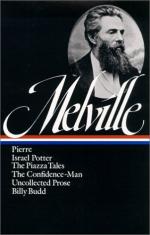Once more in beggar’s garb, the fugitive sped towards London, prompted by the same instinct which impels the hunted fox to the wilderness; for solitudes befriend the endangered wild beast, but crowds are the security, because the true desert, of persecuted man. Among the things of the capital, Israel for more than forty years was yet to disappear, as one entering at dusk into a thick wood. Nor did ever the German forest, nor Tasso’s enchanted one, contain in its depths more things of horror than eventually were revealed in the secret clefts, gulfs, caves and dens of London.
But here we anticipate a page.
CHAPTER XXIII.
ISRAEL IN EGYPT.
It was a gray, lowering afternoon that, worn out, half starved, and haggard, Israel arrived within some ten or fifteen miles of London, and saw scores and scores of forlorn men engaged in a great brickyard.
For the most part, brickmaking is all mud and mire. Where, abroad, the business is carried on largely, as to supply the London market, hordes of the poorest wretches are employed, their grimy tatters naturally adapting them to an employ where cleanliness is as much out of the question as with a drowned man at the bottom of the lake in the Dismal Swamp.
Desperate with want, Israel resolved to turn brickmaker, nor did he fear to present himself as a stranger, nothing doubting that to such a vocation his rags would be accounted the best letters of introduction.
To be brief, he accosted one of the many surly overseers, or taskmasters of the yard, who, with no few pompous airs, finally engaged him at six shillings a week, almost equivalent to a dollar and a half. He was appointed to one of the mills for grinding up the ingredients. This mill stood in the open air. It was of a rude, primitive, Eastern aspect, consisting of a sort of hopper, emptying into a barrel-shaped receptacle. In the barrel was a clumsy machine turned round at its axis by a great bent beam, like a well-sweep, only it was horizontal; to this beam, at its outer end, a spavined old horse was attached. The muddy mixture was shovelled into the hopper by spavined-looking old men, while, trudging wearily round and round, the spavined old horse ground it all up till it slowly squashed out at the bottom of the barrel, in a doughy compound, all ready for the moulds. Where the dough squeezed out of the barrel a pit was sunken, so as to bring the moulder here stationed down to a level with the trough, into which the dough fell. Israel was assigned to this pit. Men came to him continually, reaching down rude wooden trays, divided into compartments, each of the size and shape of a brick. With a flat sort of big ladle, Israel slapped the dough into the trays from the trough; then, with a bit of smooth board, scraped the top even, and handed it up. Half buried there in the pit, all the time handing those desolate trays, poor Israel seemed some gravedigger, or churchyard man, tucking away dead little innocents in their coffins on one side, and cunningly disinterring them again to resurrectionists stationed on the other.




